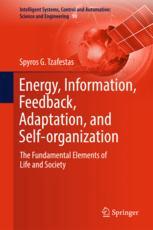

Most ebook files are in PDF format, so you can easily read them using various software such as Foxit Reader or directly on the Google Chrome browser.
Some ebook files are released by publishers in other formats such as .awz, .mobi, .epub, .fb2, etc. You may need to install specific software to read these formats on mobile/PC, such as Calibre.
Please read the tutorial at this link: https://ebookbell.com/faq
We offer FREE conversion to the popular formats you request; however, this may take some time. Therefore, right after payment, please email us, and we will try to provide the service as quickly as possible.
For some exceptional file formats or broken links (if any), please refrain from opening any disputes. Instead, email us first, and we will try to assist within a maximum of 6 hours.
EbookBell Team

4.8
64 reviewsThis unique book offers a comprehensive and integrated introduction to the five fundamental elements of life and society: energy, information, feedback, adaptation, and self-organization. It is divided into two parts. Part I is concerned with energy (definition, history, energy types, energy sources, environmental impact); thermodynamics (laws, entropy definitions, energy, branches of thermodynamics, entropy interpretations, arrow of time); information (communication and transmission, modulation–demodulation, coding–decoding, information theory, information technology, information science, information systems); feedback control (history, classical methodologies, modern methodologies); adaptation (definition, mechanisms, measurement, complex adaptive systems, complexity, emergence); and self-organization (definitions/opinions, self-organized criticality, cybernetics, self-organization in complex adaptive systems, examples in nature).
In turn, Part II studies the roles, impacts, and applications of the five above-mentioned elements in life and society, namely energy (biochemical energy pathways, energy flows through food chains, evolution of energy resources, energy and economy); information (information in biology, biocomputation, information technology in office automation, power generation/distribution, manufacturing, business, transportation), feedback (temperature, water, sugar and hydrogen ion regulation, autocatalysis, biological modeling, control of hard/technological and soft/managerial systems), adaptation and self-organization (ecosystems, climate change, stock market, knowledge management, man-made self-organized controllers, traffic lights control).